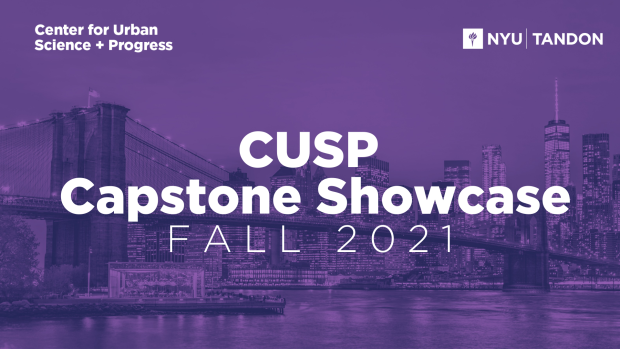CUSP students highlight their timely research projects during an info-packed showcase

After semesters of intense work, graduating students at NYU Tandon’s Center for Urban Science and Progress (CUSP) presented their Capstone projects during a mid-December showcase. The event provided a look at not only their individual areas of interest but the overall benefits of having the entirety of New York City as a living lab.
Mona Sloane — an NYU Tandon professor, senior research scientist at the NYU Center for Responsible AI, a fellow with NYU’s Institute for Public Knowledge and The GovLab, and the director of the *This Is Not A Drill* program on technology, inequality and the climate emergency at NYU’s Tisch School of the Arts — served as an instructor for the CUSP Capstone students this past semester and emceed the event. “This year, our CUSP students have pushed themselves to new heights with extremely relevant projects, and novel ways of tackling some of the most pressing problems cities face today,” she said. “Our students, alongside their sponsors and faculty mentors, are at the pulse of time. That is no accident, it is baked right into CUSP’s DNA.”
Among the extraordinarily timely topics covered was, perhaps unsurprisingly the COVID-19 pandemic: one team, comprised of Ari Lewenstein, Shu Wang, Haochen Xing and mentored by Professor Debra Laefer, examined the long-term impacts of mandated closures on small business and ways in which those could be mitigated. Another, (Chris Carey, Maia Guo, Nuoyi Wang), mentored by Research Assistant Professor Huy Vo, documented how COVID-19 exacerbated inequitable food access, severely impacting vulnerable groups, and sought to inform future food resiliency strategies in New York City.
Food access and equity were also on the minds of Nico Ampuero, Jeremy Rucker and Xiaolin Li, who were mentored by Industry Assistant Professor Alice Reznickova and NYU Stern’s Wythe Marschall during their study of how urban agriculture affects food chain resiliency and equity within the city. With COVID-19 driving interest in increasing food production within New York City, the team’s goal was to catalog all food growers within the area using geospatial techniques and data gathered from official sources and to identify urban farming hotspots, distribution gaps, and neighborhood impacts–all in an effort to increase food security and supply chain resiliency in the future.
Resiliency of another type was the focus of a project by Daisuke Nakanishi, Gurpreet Singh, Kshitij Chandana. Mentored by Assistant Professor Giuseppe Loianno and Courant’s David Mordecai, the students explored the use of drone swarms to conduct safe, efficient post-disaster assessment of buildings, roads, and infrastructure.
Other highly relevant topics covered were the privacy implications of Internet-of-Things technology (students Anbo Guo, Claudia Gomez Palacios, Letao Hou, Rachel Liu, Smriti Mohta, along with their mentor, Assistant Professor Danny Yuxing Huang); the ways in which New York City’s rezoning efforts have gone amiss (Jin Li, Qian Dong, Jaehee Kim, Karen Worthing, José Ramón Romero Pineda, mentored by Institute Professor Claudio Silva); and the optimal expansion of the New York City subway system (Nicole Allegretti, Wenting Chen, Zhuoqi Niu, mentored by Professor Kaan Ozbay, the director of C2SMART; and Stern’s Lucius J. Riccio.)
Sponsors of the projects included partners such as Kohn Pedersen Fox, NYU Stern Center for Sustainable Business, NYU Courant RiskEcon Lab for Decision Metrics, CUNY Graduate School of Public Health & Health Policy, and others.
While each project and team was unique, there was one commonality: a desire to make New York City – and other urban areas – more equitable, resilient, sustainable, and liveable.




